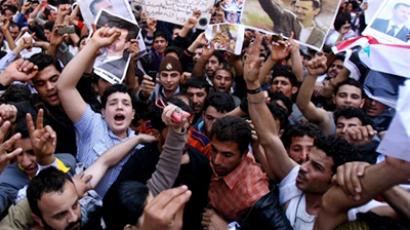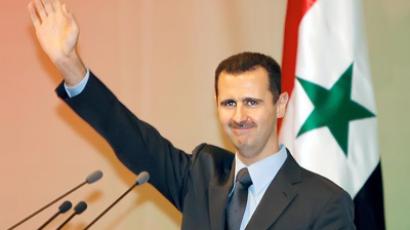Washington begins war of words against Damascus

On the heels of the EU levying sanctions against Syria, the US is ramping up pressure on Damascus, with Secretary of State Hillary Clinton vowing that the Assad regime will be held accountable for the ongoing violence in the country.
Many say the current situation mirrors the build-up to the military intervention in Libya earlier this year. In Syria, tanks and soldiers have reportedly moved deeper into residential areas as the government crackdown continues. At least 19 more people were killed, with the total number of dead nearing 800.Clinton called these reprisals brutal, and stressed that the Syrian leadership was responsible for the deaths. The US secretary of state added that the US is now looking for ways to increase international pressure on the Syrian government.According to a source in the White House, the Obama administration is edging closer to declaring Assad’s rule over Syria illegitimate. Should the Syrian president appear on Washington’s blacklist, the US will start calling for him to step down.Judging by Washington’s actions in the past, it usually starts with sanctions, and given the Libyan example, the road from sanctions to military intervention may be very short.At the same time, the prospect of adding a Syrian front to the list of US military involvement around the world would hardly make the majority of US citizens happy, as many already oppose the intervention in Libya. Technically the US has covered up its involvement in the North African country by handing over control of the operation to NATO, but no one doubts that the US is the biggest contributor to the alliance and as such largely defines its agenda.A growing number of Americans are expressing their outrage that the president, who was elected to pull them out of those never-ending wars in Iraq and Afghanistan, might lead the US into another conflict.However, despite the seeming similarity between the Libyan and Syrian cases, they are not quite the same, and therefore the consequences of getting involved with Syria may be different, too. Libyan leader Colonel Muammar Gaddafi had few, if any, friends in the region. Syria, by contrast, is Iran’s closest ally, and Tehran is unlikely to stand by and watch regime change in its closest Arab ally. And while NATO is facing a stalemate in Libya, not to mention a total disaster from the humanitarian point of view, things may turn out much worse should the West meddle in Syria’s affairs.














